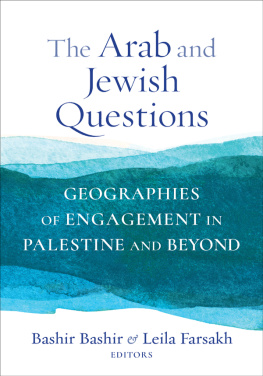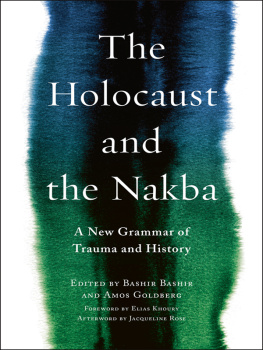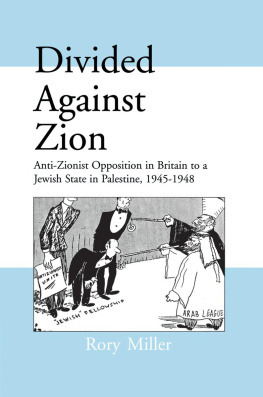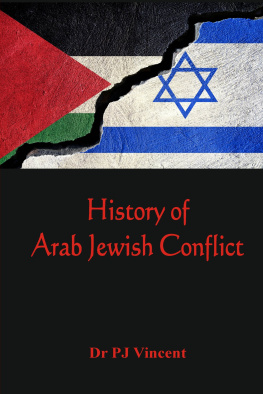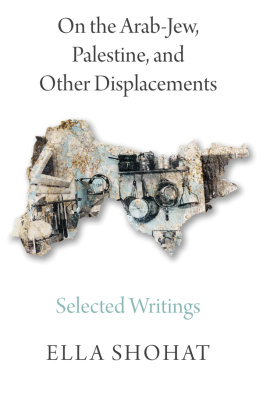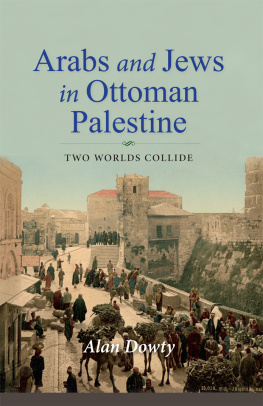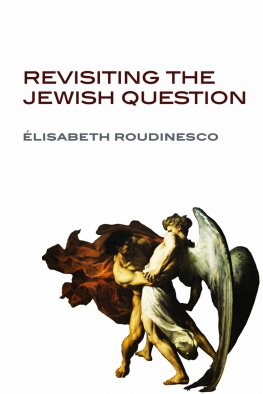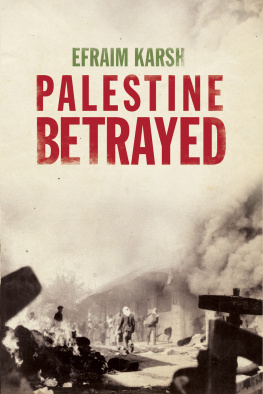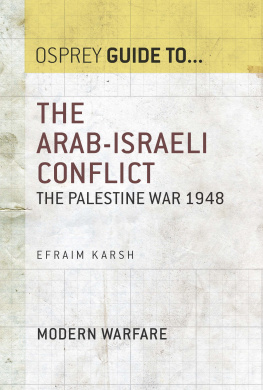Table of Contents
THE ARAB AND JEWISH QUESTIONS
RELIGION, CULTURE, AND PUBLIC LIFE
RELIGION, CULTURE, AND PUBLIC LIFE
Series Editor: Matthew Engelke
The Religion, Culture, and Public Life series is devoted to the study of religion in relation to social, cultural, and political dynamics, both contemporary and historical. It features work by scholars from a variety of disciplinary and methodological perspectives, including religious studies, anthropology, history, philosophy, political science, and sociology. The series is committed to deepening our critical understandings of the empirical and conceptual dimensions of religious thought and practice, as well as such related topics as secularism, pluralism, and political theology. The Religion, Culture, and Public Life series is sponsored by Columbia Universitys Institute for Religion, Culture, and Public Life.
For a complete list of titles, see pages 305306.
The Arab and Jewish Questions
GEOGRAPHIES OF ENGAGEMENT IN PALESTINE AND BEYOND
EDITED BY
Bashir Bashir
and Leila Farsakh

Columbia University Press
New York
Publication of this book was made possible in part
by funding from the Institute for Religion, Culture,
and Public Life at Columbia University.
Columbia University Press
Publishers Since 1893
New York Chichester, West Sussex
cup.columbia.edu
Copyright 2020 Columbia University Press
All rights reserved
E-ISBN 978-0-231-54448-1
Library of Congress Cataloging-in-Publication Data
Names: Bashir, Bashir, 1976 editor. | Farsakh, Leila, editor.
Title: The Arab and Jewish questions: geographies of engagement in Palestine and beyond /
edited by Bashir Bashir and Leila Farsakh.
Other titles: Religion, culture, and public life.
Description: New York: Columbia University Press, [2020] | Series: Religion, culture, and public
life | Includes bibliographical references and index.
Identifiers: LCCN 2020017701 (print) | LCCN 2020017702 (ebook) | ISBN 9780231199209
(hardback) | ISBN 9780231199216 (paperback) | ISBN 9780231552998 (ebook)
Subjects: LCSH: Jewish-Arab relations. | Arab-Israeli conflict. | Palestinian ArabsPolitics and
government. | JewsPolitics and government. | Palestinian ArabsLegal status, laws, etc. |
JewsLegal status, laws, etc. | Political rightsPalestine. | NationalismPalestine.
Classification: LCC DS119.7 .A67164 2020 (print) | LCC DS119.7 (ebook) | DDC 956.94dc23
LC record available at https://lccn.loc.gov/2020017701
LC ebook record available at https://lccn.loc.gov/2020017702
A Columbia University Press E-book.
CUP would be pleased to hear about your reading experience with this e-book at .
Cover design: Lisa Hamm
Cover image: Adobe Stock
To Gertraud Auer-Borea dOlmo, who paved the way for these engagements and much more, with love and admiration
CONTENTS
Introduction: Three Questions That Make One
BASHIR BASHIR AND LEILA FARSAKH
Chapter One
Jackals and Arabs: Once More on the German-Jewish Dialogue
GIL ANIDJAR
Chapter Two
An Emblematic Embrace: New Europe, the Jewish State, and the Palestinian Question
BRIAN KLUG
Chapter Three
Palestine in Algeria: The Emergence of an Arab-Islamic Question in the Interwar Period
AMAL GHAZAL
Chapter Four
On Orientalist Genealogies: The Split Arab/Jew Figure Revisited
ELLA SHOHAT
Chapter Five
Returning to the Question of Europe: From the Standpoint of the Defeated
HAKEM AL-RUSTOM
Chapter Six
Between Shared Homeland to National Home: The Balfour Declaration from a Native Sephardic Perspective
YUVAL EVRI AND HILLEL COHEN
Chapter Seven
Toward a Field of Israel/Palestine Studies
DEREK PENSLAR
Chapter Eight
Apocalypse/Emnity/Dialogue: Negotiating the Depths
JACQUELINE ROSE
Chapter Nine
Competing Marxisms, Cessation of (Settler) Colonialism, and the One-State Solution in Israel-Palestine
MOSHE BEHAR
Chapter Ten
Dialectic of the National Identities in Palestinian Society and Israeli Society: Nationalism and Binationalism
MARAM MASARWI
We are indebted to the Bruno Kreisky Forum for International Dialogue in Vienna for hosting a series of workshops and to the Forums team for their generous and warm hospitality. The workshops that served as the basis of this volume were convened at the Bruno Kreisky Forum under the themes Arab Engagements with the Jewish Question and Jewish Engagements with the Arab Question. We thank all the participants of the workshop series for enriching and provocative intellectual exchanges that shaped this volume. In addition, we are grateful for the rigorous and encouraging comments of two anonymous reviewers on the manuscript of this volume. Finally, we thank Rachel Busbridge, Azar Dakwar, Amos Goldberg, Nadim Khoury, Dirk Moses, Lena Salaymeh, and all the contributors of this volume for their comments on various versions of the introduction.
BASHIR BASHIR AND LEILA FARSAKH
Many scholars have studied the causes underlying these developments. Gilbert Achcar, for example, argues that deep roots of the Arab uprisings are located mainly in the specific economic features that characterize these societies rather than in simplistic political or cultural explanations. These perspectives provide a much-needed critical analysis that goes beyond the dominant discourses on Arab uprisings, European Islamophobia, and Israeli-Palestinian conflict. However, they overlook the underlying links between these supposedly disconnected developments that are taking place in three different geographical sites.
No study has explored the intersections between the rise of Islamophobia in the West, the failure to resolve the Arab-Israeli conflict, and the political meanings of the Arab uprisings. Neither have many scholars examined how these developments are tied to three seemingly unrelated questions, namely the question of Israel-Palestine, the Arab-Muslim question, and the Jewish question. These questions, this book argues, are not only entangled, but also belong to the same historyone that continues to foment tensions in the Middle East, Europe, and the United States. The book seeks to shed new light on this history by offering a new, critical investigation of the Arab and Jewish questions. More specifically, it aspires to revisit contemporary Arab engagements with the question of Jewish political rights (as individuals, religious communities, and/or a national collective) under the light of European anti-Semitism and Zionism. It also explores Jewish engagements with the Arab question, namely how Zionism and non-Zionist Jewish voices dealt with the Palestinian presence and political rights in historic Palestine. These two key political questions have been historically debated, but not juxtaposed, despite the fact that they have become inextricably intertwined.

